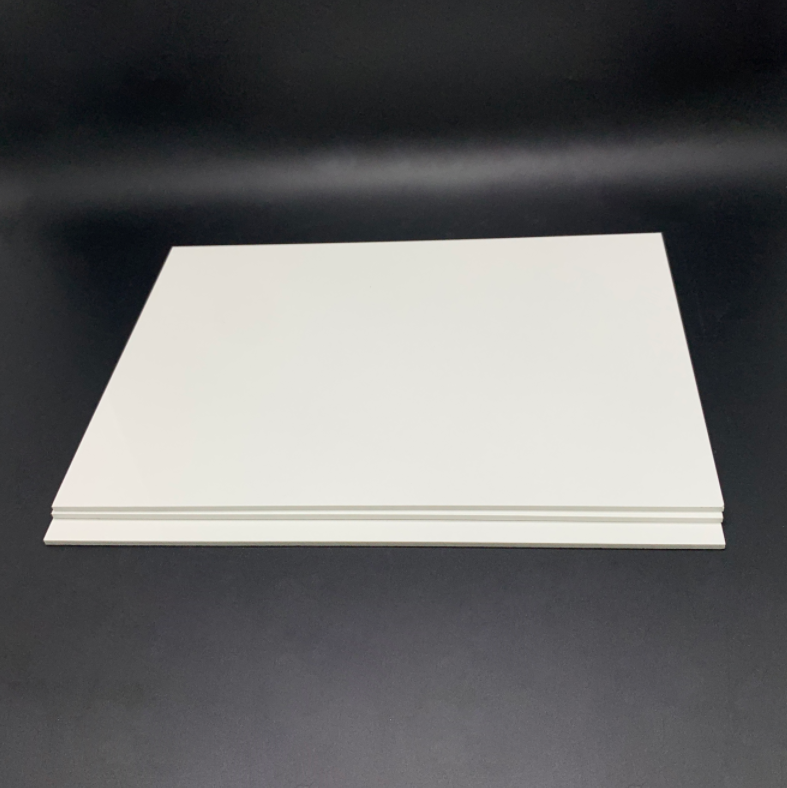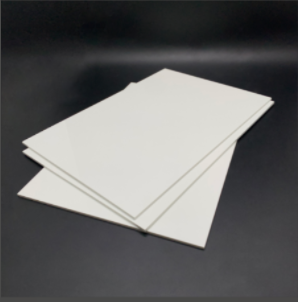White SMC Sheet
2 week agoSMC is a thermoset composite material composed of a resin matrix (25-35%, typically unsaturated polyester, vinyl ester, or epoxy), glass fibers (20-30% for reinforcement), fillers (40-60%, e.g., calcium carbonate, talc, or aluminum hydroxide), and additives (1-5%, including initiators, thickeners, and release agents). Optional components like carbon fibers, flame retardants, or low-shrink agents enhance specific properties.
The production process involves:
-
Mixing: Resin, fillers, and additives are blended into a homogeneous paste.
-
Thickening: Magnesium oxide is added to increase viscosity, forming a handleable sheet.
-
Fiber Incorporation: Chopped glass fibers (25-50 mm) are layered onto the resin paste.
-
Maturation: The sheet is stored to achieve optimal viscosity (24-72 hours).
-
Compression Molding: Pre-cut SMC sheets are placed in a heated mold (130-160°C, 5-20 MPa pressure) and cured for minutes to form the final product.
-
Post-Processing: Trimming and surface finishing are performed as needed.
SMC’s high-strength, lightweight, and corrosion-resistant properties make it ideal for automotive, electrical, and structural applications.

Characteristics and Applications of SMC (Sheet Molding Compound):
SMC is a high-performance thermoset composite renowned for its lightweight nature, high strength-to-weight ratio, and excellent dimensional stability. Key characteristics include:
-
Mechanical Strength: Reinforced with glass or carbon fibers, SMC offers exceptional tensile, flexural, and impact resistance comparable to metals like aluminum.
-
Corrosion Resistance: Resistant to chemicals, moisture, and UV exposure, making it ideal for harsh environments.
-
Thermal Stability: Retains properties at elevated temperatures (up to 180°C with specific resins).
-
Design Flexibility: Easily molded into complex geometries with tight tolerances, integrating ribs, bosses, and textures.
-
Electrical Insulation: Non-conductive properties suit electrical applications.
-
Flame Retardancy: Achievable via additives (e.g., aluminum hydroxide) for fire-sensitive uses.
-
Low Shrinkage: This minimizes post-molding distortion, ensuring precision.
Applications span diverse industries:
-
Automotive: Body panels, battery housings (EVs), bumpers, and under-hood components, reducing weight for fuel efficiency.
-
Electrical/Electronics: Circuit breaker enclosures, insulators, and switchgear due to dielectric strength and heat resistance.
-
Construction: Durable roofing, sanitary ware (bathtubs, sinks), and water tanks resistant to corrosion and wear.
-
Aerospace: Interior components and non-structural parts requiring lightweight durability.
-
Industrial: Pump housings, conveyor parts, and agricultural equipment benefiting from chemical resilience.
-
Renewable Energy: Wind turbine nacelles and solar panel supports.
SMC’s versatility, cost-effectiveness for mass production, and sustainability (recyclable options) position it as a critical material in modern engineering, displacing traditional metals and plastics.

Similar Video Recommendation
You May Also Like
If you are interested in the product, contact Bossgoovideo.com for more information
- *To:
- SHENZHEN XIONGYIHUA PLASTIC INSULATION LTD
- *Message:
-
Submit
Main Product:
POM SHEET,
FR4 Sheet,
Nylon Sheet,
Bakelite Sheet,
ABS Sheet ,
PTFE Sheet



















